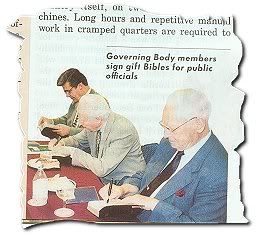Pistoff:"You are welcome to that translation; to me it is lifeless, technical and soulless."
Actually, it is quite dynamic. By using extra words to convey the "originals," the NWT makes some stories more meaningful, emotional, and accurate. The story of Joseph is more vivid in the NWT than in the average version because of its application of the Hebrew verb forms. Some scriptures transmit more power and feeling. Consider two:
John 11:35, New American Standard Bible: "Jesus wept."
NWT: "Jesus gave way to tears." (reflecting the Greek ingressive aorist tense)
Which agrees better with the context? In the NASB, Jesus is being described as having just "wept," as if it was a past or done action. In the NWT, Jesus is being portrayed as responding in a deeply emotional way, as not being able to contain himself from the pain he felt when he saw Mary and the Jews coming to him "weeping." Yes, Jesus burst into tears!
John 2:16, King James Version: "make not my Father's house an house of merchandise."
NWT: "Stop making the house of my Father a house of merchandise!"
Which agrees with the context? Were those men warned ‘not to make Jesus' Father's house an house of merchandise,’ implying perhaps that the action had not begun?
Or, were they not rather doing business already, and Jesus commanded them in righteous zeal to stop making the house of his Father a house of merchandise?
Which translation reflects the Greek prohibition in the present tense and the context better?

